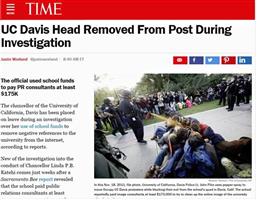


Is Search Engine Suppression an Ethical Practice?
[by Howard Fencl, Hennes Communications]
The University of California, Davis Chancellor Linda P.B. Katehi is on administrative leave for spending university cash to push negative news down in search engine results, among other allegations. She authorized spending $175,000 with a search engine suppression (SES) firm in an effort to move five-year-old headlines about campus police pepper spraying peaceful student protesters off the main Google search return page for UC Davis. Regrettably, the SES firm’s proposal contained language stating that the purpose of the work was to eradicate “…references to the pepper spray incident in search results on Google for the university and the Chancellor.”
“There is a lot of misinformation about what search engine suppression of negative content actually constitutes,” says Scott Juba, Hennes Communication social media consultant and president of Radar Public Relations & Consulting. “Search engine suppression does not involve erasing negative online content. Instead, search engine suppression is the process of strategically publishing new content that is likely to rank above and push down the negative content in Google rankings.”
Still, there are calls for President Katehi’s resignation over the SES incident. Students and those demanding her resignation insist she tried to “scrub” the past. Katehi is standing fast but has apologized for the $175,000 SES bill, and said it was a mistake to allow a contract with “…inappropriate language to exist. I take responsibility for that. We never, ever intended to delete – you cannot first of all do that – but we never intended to erase history.” In the first of a series on videos intended to better connect with students, Katehi said the goal of the SES program was to ensure that when people search for UC Davis, they first see all the opportunities the school has to offer.
So is SES ethical? Scott Juba says that as long as all of the new content being published is true and that no “black hat” SEO tactics that violate Google’s Terms of Service were used, it is absolutely ethical for an organization or institution to publish its content online. If SES were an unethical practice, then no one should ever publish new positive content when negative news appears on page one of a Google search of your organization. Because that assertion runs counter to everything web publishing is about for marketers, it is patently absurd.
SES must always be about telling the truth. If you are loading up the web with manufactured feel-good stories just to push down bad news about your organization, the media will always see through it, and social media users – trolls or not – will swarm and immediately pillory you. Tell the truth, tell it all and tell it first is as much true for SES as it is for every aspect of communication with your key audiences.